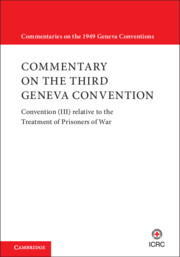 Commentary on the Third Geneva Convention
Commentary on the Third Geneva Convention Book contents
- Commentary on the Third Geneva Convention
- International Committee of the Red Cross
- Copyright page
- Contents
- Foreword by Peter Maurer
- Acknowledgements
- Abbreviations
- Introduction
- Preamble
- Part I General Provisions
- Part II General Protection of Prisoners of War
- Part III Captivity
- Part IV Termination of Captivity
- Part V Information Bureaux and Relief Societies for Prisoners of War
- Part VI Execution of the Convention
- Book part
- Sources
- Index
- References
Introduction
Published online by Cambridge University Press: 21 August 2021
- Commentary on the Third Geneva Convention
- International Committee of the Red Cross
- Copyright page
- Contents
- Foreword by Peter Maurer
- Acknowledgements
- Abbreviations
- Introduction
- Preamble
- Part I General Provisions
- Part II General Protection of Prisoners of War
- Part III Captivity
- Part IV Termination of Captivity
- Part V Information Bureaux and Relief Societies for Prisoners of War
- Part VI Execution of the Convention
- Book part
- Sources
- Index
- References
Summary
The Geneva Convention relative to the Treatment of Prisoners of War is the third offour Conventions adopted by the Diplomatic Conference of Geneva of 1949. It providesa detailed and comprehensive framework for the treatment of prisoners of war, namelymembers of the armed forces and other defined categories of persons who fall intoenemy hands during an international armed conflict. Prisoners of war must at alltimes be treated humanely, with respect for their persons and their honour. Manyprovisions in the Third Convention flow from this fundamental principle or seek toput guarantees in place to ensure compliance with it.
- Type
- Chapter
- Information
- Commentary on the Third Geneva ConventionConvention (III) relative to the Treatment of Prisoners of War, pp. 1 - 38Publisher: Cambridge University PressPrint publication year: 2021
